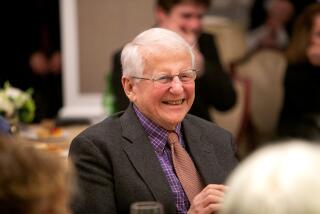Mark Medoff, playwright whose ‘Children of a Lesser God’ won a Tony and an Oscar, dies

Mark Medoff, a provocative playwright whose “Children of a Lesser God” won Tony and Olivier awards and whose screen adaptation of his play earned an Oscar nomination, has died while in hospice care in Las Cruces, N.M. He was 79.
Medoff died Tuesday in a hospice surrounded by family, according to his daughter, Jessica Bunchman. He had been battling multiple myeloma and renal failure, she said in a family statement.
Medoff wrote 30 plays and wrote, produced or directed 19 movies. He found his greatest success with “Children of a Lesser God,” the tale of a troubled love affair between a speech teacher and a deaf woman who struggle to overcome the communication gap between their two worlds.
Phyllis Frelich won a Tony in 1980 for her Broadway portrayal of Sarah Norman, the deaf woman at the heart of the play, which ran for almost 900 performances. It was later made into a movie in 1986 that won an Academy Award for actress Marlee Matlin, who co-starred opposite William Hurt.
“He had a way of making every creative heart with whom he worked feel as if their work, or their part in his work, was the single most important thing to him in the moment,” the family said. “In turn, hundreds of writers, actors, directors and creatives all over the world consider Mark Medoff a mentor.”
“He insisted and fought the studio that the role be played by a deaf actor,” Matlin tweeted. “I would not be here as an Oscar winner if it weren’t for him. RIP Dear Mark.”
A Broadway revival last year of “Children of a Lesser God” starred Joshua Jackson and Lauren Ridloff, a former Miss Deaf America who earned a Tony nomination.
Medoff’s work often tackled social issues, including animal testing and AIDS in the play “Prymate,” American myths and disorders in the Obie-winning stage work “When You Comin’ Back, Red Ryder?” and poverty in India in his screenplay for the 1992 film “City of Joy.” His 2015 play, “Marilee and Baby Lamb: The Assassination of an American Goddess,” is about the last days of Marilyn Monroe.
“Everything I do probably starts more from a social issue impulse than anything else,” the playwright said in 2004. “I went to a psychologist when I was 18 or 19 and he said I was the first kid he’d ever met who was rebelling against a happy childhood. So when I started writing, I began to expropriate social issues and quickly roped myself out of my angst.”
Medoff was inspired to write “Children of a Lesser God” after meeting Frelich and her husband, Robert Steinberg, a lighting designer. “I told him there were no roles for deaf actresses,” Frelich recalled. “He said, ‘OK, I’ll write a play for you.’ He did. He went home and wrote ‘Children of a Lesser God.’ He wanted to write a good play.”
Medoff was co-founder of the American Southwest Theatre Company and head of the department of theater arts for nine years at New Mexico State University, where he taught for years. He helped form the Creative Media Institute for Film and Digital Arts in 2005.
“When the Creative Media Institute was just getting going, Mark told the faculty, ‘Look, we can sit around and talk about how to teach people to make movies, or we can just go make movies,’ which reflected his philosophy across life,” said Amy Lanasa, a friend who now heads the institute. “Why sit around talking about it when you can get up and take action or create something?”
Medoff’s other works include the plays “The Wager,” ’’The Hand of Its Enemy,” ’’The Heart Outright,” ’’The Majestic Kid” and the screenplay for the HBO movie thriller “Apology.” He also penned the 1978 Chuck Norris action film, “Good Guys Wear Black” and the black comedy “Refuge” starring Linda Hamilton in 2010.
His second original Broadway play was in 2004 with “Prymate,” which closed quickly after 23 previews and five performances, having in one week only filled 8% of the theater’s capacity.
Medoff was born March 18, 1940, in Mount Carmel, Ill., and grew up in Miami, where he received a bachelor’s in English from the University of Miami in 1962. He completed graduate studies in English in 1966 at Stanford University. In 1981, he received an honorary degree from Gallaudet University for exemplary service to the deaf community.
He is survived by his second wife, Stephanie Thorne; three daughters, and eight grandchildren.
More to Read
Start your day right
Sign up for Essential California for the L.A. Times biggest news, features and recommendations in your inbox six days a week.
You may occasionally receive promotional content from the Los Angeles Times.






